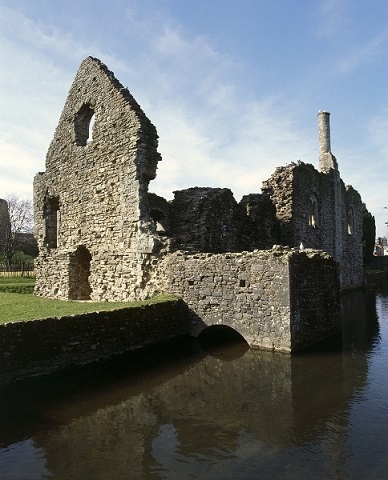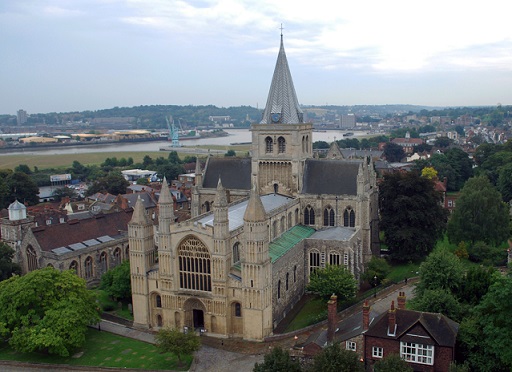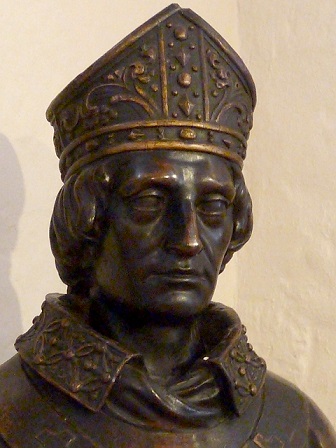John and Langton negotiate over Rochester
by Professor Nicholas Vincent
25 January 1215 - 31 January 1215
| Date | Place | Sources | Notes |
|---|---|---|---|
25 Jan 1215 |
RLC, i, 180b, 184b, 185 |
Hardy ('Itinerary') suggests a return to Aldingbourne on 26 January. |
|
25-27 Jan 1215 |
RLC, i, 183b, 185-5b |
An entry in RLC, i, 178, places the King at Clarendon on 25 January |
|
28-29 Jan 1215 |
RLC, i, 183b-4, 185-5b |
||
30 Jan 1215 |
RLC, i, 180b-181, 184, 185b |
||
31 Jan 1215 |
RC, 205b; RLP, 127b; RLC, i, 185-6 |
Passing by the bishop of Chichester's manor at Aldingbourne on Sunday 25 January (where a measure of wine was drunk at a cost of 30 shillings), the King travelled via Stansted to Winchester. 1 Leaving Winchester on Friday 30 January, he then passed via Southampton and Christchurch into Dorset. At Christchurch, on 31 January, he granted the only charter recorded on the Charter Roll this week, confirming the canons of Christchurch in possession of a manor gifted by Hawise de Reviers, daughter of the earl of Devon. The transaction was witnessed by a group of courtiers, including Peter des Roches, the forester Hugh de Neville, the Breton Philip d'Aubigny, and here making one of his first appearances in royal service, the Somersetshire knight, Godfrey of Crowcombe, later to achieve high office at the court of King Henry III.2 There was continuing concern for defence. The castles of Winchester and apparently Gloucester were put under repair, and orders were sent to admit reinforcements to Nottingham castle.3 John of Bassingbourne, one of the King's military commanders, was instructed to receive a man named Gerard of Flanders, to assist with the manufacture of crossbow bolts.4 Detailed orders were issued for the supply of wine, red and white, both for the King's immediate needs and to provision royal houses or castles at Wallingford, Brill, Finmere, Silverstone, Wakefield, Northampton, Geddington, Sauvey and Rockingham.5 Reginald of Cornhill was urgently required to supply the court with 300lbs of wax, presumably for candles.6
On the political front, the loyalty of the earl of Chester was rewarded with the grant of a Lincolnshire wardship.7 Arrangements were made to pay the expense of monks travelling from Durham to discuss election to their see, still vacant despite failed attempts since 1208 to elect either papal or royal candidates.8 Licence was granted to William de Mortimer to come to England on pilgrimage to the shrines of St Edmund at Bury and St Thomas at Canterbury.9 This presumably refers to the Norman William de Mortimer, before 1204 castellan of Arques who, together with other leading Norman barons, had been involved in negotiations with the English court, before the débacle of July 1214.10 Of particular interest, although never before explained, the dorse of the Charter Roll records a letter of Stephen Langton. It is there misdated to 20 January. In reality, as revealed by a further copy preserved in the cartulary of Rochester Cathedral, it was issued at Winchester on 28 January. A counterpart letter, issued by the King, on the same occasion, in precisely the same terms and with the same witnesses, survives in the cartulary of the archbishopric of Canterbury in Lambeth Palace Library.
The most obvious feature of these instruments is that they were written in French. As such, they are the first vernacular texts recorded in the chancery rolls. Here, we encounter a rare echo of the language spoken at court. The extreme variation of spelling between the chancery, Canterbury and Rochester copies is itself testimony to the difficulty experienced by the King's clerks in dealing with French as a written rather than as a spoken language. Certainly, this should remind that the Latin letters recorded more generally in the chancery rolls were themselves merely the written records of negotiations and discussions conducted in the French vernacular. It is a noticeable feature of the events of 1215 that the crisis that led to Magna Carta produced not only the Rochester letters of John and Langton, but a substantial portfolio of French translations of the coronation charters of Henry I, King Stephen and Henry II, quite possibly carried on to the field of Runnymede in 1215.11
As for the Rochester letters, we need to consider not only what they contain, but why their contents were presented in French rather than in Latin. By the time that they were issued, the charter of free elections, first granted in late December, renewed on 15 January, was already on its way for papal confirmation in Rome.12 The patronage of Rochester had been conferred upon Stephen Langton by a royal charter dated 22 November.13 Thereafter, Langton had secured the election and consecration of Benedict of Sawston, his own pupil and candidate, as bishop of Rochester.14 Despite all of this, archbishop and King now agreed that, should the King claim the bishopric of Rochester as his own, none of the actions of 1214 or early 1215 were to prejudice the rights either of the King or his heirs. Only if a firm 'peace', presently under discussion between King and archbishop, should be confirmed could the archbishop consider the King's charter granting Rochester to Canterbury to be binding in perpetuity. In other words, not only was the King still unprepared to concede the justice of Langton's claims to Rochester, but neither King nor archbishop as yet considered themselves bound by anything approaching a final 'peace'.
Moreover, and here explaining the most extraordinary feature of these letters, the fact that both sides of the agreement, issued by Langton and the King, were written in French surely implies that both parties deliberately shunned the standard Latin of the law. They instead exchanged instruments, written in French, that set out the possible terms for agreement, but without taking the final steps into Latin that would have been required for these instruments to become legally enforceable. In other words, both parties were attempting to evade what they considered to be the bad faith of the other. Neither Langton nor King John considered themselves satisfied, Langton because the King had still not paid proper financial compensation for the damages suffered by the exiled clergy during the Interdict, the King because he considered Langton's claims over Rochester to be unproved.
Just as the barons had complained at their Epiphany meeting, the King's arguments for delay were only too clearly attempts to shrug off the obligation to do justice ('When the King sought delays ... he was not heard with sympathy, various people alleging that he had quite another intention in mind, as in time was duly proved').15 For all their exchange of pleasantries, with the archbishop addressing the King as his 'dear lord', and the King addressing Langton as his 'dear father', the Rochester letters demonstrate a deep lack of trust. The archbishop was obliged publicly to acknowledge that, if he failed to make final peace with the King, the King could renege on the terms of his charter granting the advowson of Rochester to Canterbury. The King, as we know from the papal letters that by late January were already being solicited from Rome, believed the archbishop guilty of conspiracy with the barons.16 This was a situation almost bound to undermine the archbishop's capacity for mediation, making it even more difficult to establish confidence in negotiations between the King and his discontented subjects.
1 | For the measure of wine, see RLC, i, 185, 185b. |
2 | RC, 205-5b, and for Godfrey, see D. Carpenter, 'The Career of Godfrey of Crowcombe: Houshold Knight of King John and Steward of King Henry III', War, Government and Aristocracy in the British Isles, c.1150-1500. Essays in Honour of Michael Prestwich, ed. C. Given-Wilson, A. Kettle and L. Scales (Woodbridge, 2008), 26-54. |
3 | RLC, i, 183b-4, 185, 185b. |
4 | RLC, i, 185. |
5 | RLC, i, 185. |
6 | RLC, i, 185b. |
7 | RLC, i, 185. |
8 | RLC, i, 184, and cf. J. Le Neve, Fasti Ecclesiae Anglicanae, 1066-1300, 11 vols. (London, 1968-2011), ii, (Monastic cathedrals, Northern and southern provinces), ed. D. E. Greenway (London, 1971), 30-1. |
9 | RLP, 127b. |
10 | For the Norman William, see RLP, 10b, 22. He may perhaps be the same William de Mortimer, after 1204 deprived of land in Lincolnshire and Norfolk: RLC, i, 6, 15b. He is presumably distinct from the William de Mortimer, knight of David earl of Huntingdon, closely associated with the Scots royal court and a rebel in 1215: RLC, i, 217b, 250, 324, and cf. K.J. Stringer, Earl David of Huntingdon, 1152-1219: A Study in Anglo-Scottish History (Edinburgh, 1985), 169-70. |
11 | BL ms. Harley 458, for which see J. C. Holt, Magna Carta (Cambridge, 1992), 474-7, plates 4-5. |
12 | See diary and itinerary, week beginning 4 January, where the reissue of the charter of free elections, originally granted on 21 November 1214, is assigned to 15 January 1215, and where it is suggested that the mission that carried it to Rome was headed by Peter Saracen and Hugh abbot of Beaulieu. An alternative possibility is that either it, or perhaps more likely the demand for arbitration against Langton over Rochester, was communicated to the Pope by Jordan de Stukeley, on 22 January authorized and on 30 January paid for a mission overseas: RLP, 127b; RLC, i, 184. |
13 | RC, 202b, and for the background, weeks beginning 10 August, 9 November, 16 November. |
14 | |
15 | Memoriale fratris Walteri de Coventria, ed. W. Stubbs (2 vols., Rolls ser., 1872-3), ii, 218, as in January's Feature of the Month on the New Temple conference. |
16 | Selected Letters of Pope Innocent III concerning England (1198-1216), ed. C.R. Cheney and W. H. Semple (London, 1953), 196-7 no.75. |
- February 1214 - June 1214 (1)
- June 1214 - July 1214 (3)
- July 1214 - August 1214 (4)
- August 1214 - September 1214 (5)
- John hears of Bouvines and reconsiders his position
3 August 1214 - 9 August 1214 - John plans his return to England
10 August 1214 - 16 August 1214 - John’s spies intercept a letter of Aimery of Thouars
17 August 1214 - 23 August 1214 - John refuses to abandon his French lands
24 August 1214 - 30 August 1214 - John grants a truce to Philip Augustus and seeks the release of William Longespée
31 August 1214 - 6 September 1214
- John hears of Bouvines and reconsiders his position
- September 1214 - October 1214 (4)
- Negotiations with Philip Augustus
7 September 1214 - 13 September 1214 - Peace with Philip Augustus
14 September 1214 - 20 September 1214 - John’s chancery staff departs for England
21 September 1214 - 27 September 1214 - John demonstrates his willingness to rule according to law
28 September 1214 - 4 October 1214
- Negotiations with Philip Augustus
- October 1214 - November 1214 (4)
- John prepares for his passage back to England
5 October 1214 - 11 October 1214 - John’s sea journey and landing at Dartmouth
12 October 1214 - 18 October 1214 - The regency government of Peter des Roches
19 October 1214 - 25 October 1214 - From the Tower, John sends a coded message to his queen
26 October 1214 - 1 November 1214
- John prepares for his passage back to England
- November 1214 - December 1214 (5)
- Drama and jokes at Bury St Edmunds
2 November 1214 - 8 November 1214 - The matter of episcopal elections
9 November 1214 - 15 November 1214 - John grants freedom of election
16 November 1214 - 22 November 1214 - John visits Wiltshire
23 November 1214 - 29 November 1214 - King John prepares for Christmas and intimidates electors
30 November 1214 - 6 December 1214
- Drama and jokes at Bury St Edmunds
- December 1214 - January 1215 (4)
- January 1215 (4)
- February 1215 (4)
- March 1215 - April 1215 (5)
- John takes the cross, on Ash Wednesday
1 March 1215 - 7 March 1215 - John's fears of French invasion abate
8 March 1215 - 14 March 1215 - John moves to secure the frontier zone
15 March 1215 - 21 March 1215 - John hunts in Nottinghamshire
22 March 1215 - 28 March 1215 - John prepares for trouble in the North
29 March 1215 - 4 April 1215
- John takes the cross, on Ash Wednesday
- April 1215 - May 1215 (4)
- May 1215 - June 1215 (5)
- 'our barons who are against us'
3 May 1215 - 9 May 1215 - 'by the law of our realm or by judgment of their peers'
10 May 1215 - 16 May 1215 - The rebels seize London
17 May 1215 - 23 May 1215 - John negotiates with the Pope and archbishop Langton
24 May 1215 - 30 May 1215 - Negotiation with the rebels
31 May 1215 - 6 June 1215
- 'our barons who are against us'
- June 1215 - July 1215 (4)
- July 1215 - August 1215 (4)
- August 1215 - September 1215 (5)
- September 1215 - October 1215 (4)
- October 1215 (4)
- A meeting with the Cistercian abbots
4 October 1215 - 10 October 1215 - John and the siege of Rochester: week one
11 October 1215 - 17 October 1215 - Rochester week two, the siege of Norham and the return of Giles de Braose
18 October 1215 - 24 October 1215 - John and the siege of Rochester: week three
25 October 1215 - 31 October 1215
- A meeting with the Cistercian abbots
- November 1215 - December 1215 (5)
- John and the siege of Rochester: week four
1 November 1215 - 7 November 1215 - John and the siege of Rochester: week five
8 November 1215 - 14 November 1215 - John and the siege of Rochester: week six
15 November 1215 - 21 November 1215 - John and the siege of Rochester: week seven
22 November 1215 - 28 November 1215 - The fall of Rochester Castle
29 November 1215 - 5 December 1215
- John and the siege of Rochester: week four
- December 1215 - January 1216 (4)
- January 1216 (3)


